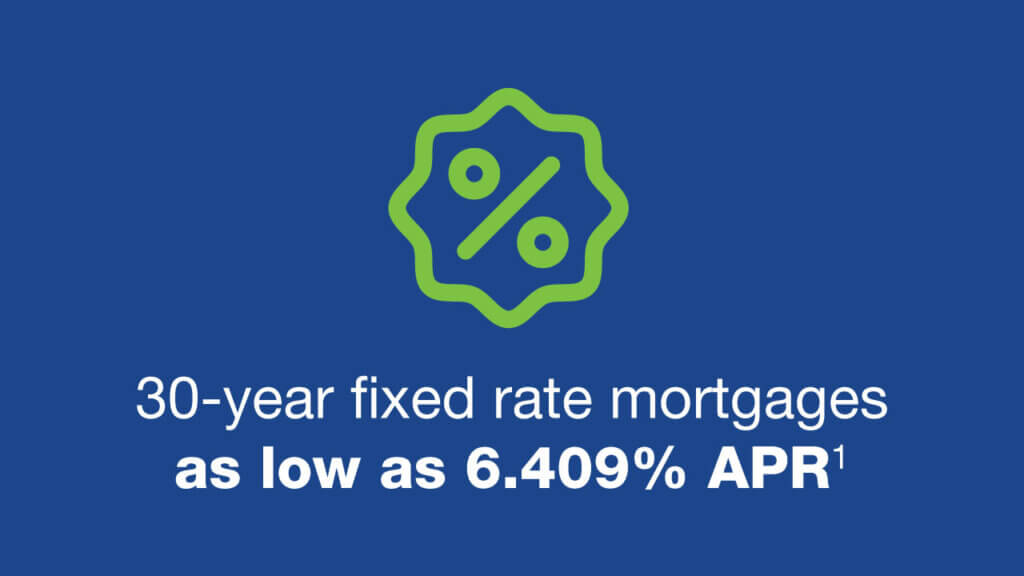Home ownership may be closer than you thought. Find out how an FHA loan can help you purchase a house, even if you have a lower credit score or existing debt.
FHA Home Loans


We’re here to help you meet your homeownership goals! We also prioritize speed for clients, with an average turnaround of only 22 days from application completion to ready-to-close for purchase loans!1

What is an FHA Loan?
An FHA loan is a government-backed mortgage loan with additional requirements. These home loans are backed and insured by the Federal Housing Administration (FHA), meaning the lender is insured in the event that a homebuyer defaults on the loan.
These loans are specifically designed to simplify the path to home ownership for low-income borrowers. With lower down payment options, lower closing costs and low minimum credit scores, FHA loans can be a huge advantage for first-time homebuyers who may not meet the criteria for another type of mortgage.
There are a few requirements homebuyers should know about. For one thing, the home you purchase with your loan must be your primary residence–not an investment property. You must move into the home within 60 days of closing. Additionally, the home will need to be inspected by an FHA-approved appraiser.
Loan Amounts
Location, location, location… FHA loan limits can be as much as $472,030 for low-cost areas and $1,089,300 for high-cost areas.
Interest Rates
Because these loans are government-backed and risk is low, lenders can offer more competitive interest rates.
Repayment Terms
Standard loan term is 30 years.
Down Payment
FHA loans are known for requiring smaller than average down payments–as little as 3.5%.
Credit Score
Enjoy more flexibility with a lower credit score–580 is the minimum credit score required for this loan option.
Eligibility
You must have your home appraised by an approved appraiser, live in the house as your primary residence, and move into the house within 60 days of closing.
Current FHA Loan Rates
-
FHA 30 Year Fixed
- Rate 6.500%
- APR 7.071%
FHA Loan Requirements
Generally speaking, FHA loan requirements may differ from conventional guidelines. For one thing, any home you’re interested in purchasing must be appraised by an FHA-approved appraiser. The home you purchase must be your primary residence (not an investment property or vacation home). Once you close, you must move into the home within 60 days.
FHA Loans vs Conventional Loans
If you’re not sure whether to choose an FHA loan or a conventional mortgage, consider this: though conventional loans have lower interest rates and mortgage insurance requirements that drop off after the loan to value (LTV) is 80% or less, they also have stricter financial requirements. On the other hand, FHA loans require monthly insurance payments throughout the life of the loan (or 11 years with a 10% or more down payment). Both types of home loans have their advantages and can mesh well with your lifestyle, depending on your needs and abilities.
Common Types of FHA Loans
Federal Housing Administration loans come in a few different shapes and sizes. Keep in mind that the type of FHA loan you choose will generally limit what kind of home you can purchase, as well as how much you can spend. If you don’t see a loan here that fits your needs, let us know–in most cases, we can help you find a mortgage that works with your financial situation.
1. Traditional Mortgage
This is the most basic type of FHA loan. It’s designed to help you purchase a primary residence with more competitive interest rates, a smaller down-payment and lower credit score requirement.
2. Cash-Out Refinance
Even with a credit score as low as 600, you can borrow up to 80% of your home’s value with a cash-out mortgage refinance. This kind of FHA loan can help you convert your home equity to cash, which you can then use for big expenses, debt payments and even home improvement projects.
3. FHA Rate/Term Refinance
If you’re having a hard time making your monthly mortgage payment or want to take advantage of lower interest rates, an FHA rate and term refinance may help. With this loan, you can change the terms of your current loan or even change your loan type to your advantage.
4. Energy Efficient Mortgage Program
Go green with an FHA loan specially designed to support energy-efficient home features. This loan enables homebuyers to purchase a home or upgrade their existing home with cost-saving, energy-efficient improvements, ideally leading to lower monthly utility bills.
Common Questions about FHA Loans
-
Is it possible to get rid of my FHA mortgage insurance?
Unless you put down 10% or more, FHA mortgage insurance lasts for the life of the loan, or for 11 years depending on the loan’s length. The only way to get rid of FHA mortgage insurance is to refinance to a conventional loan.
-
How much does FHA mortgage insurance typically cost?
Your mortgage premium–typically 1.5% of your loan balance–is due upfront at closing. Your annual mortgage insurance premium will be paid alongside or as a part of your monthly mortgage payment. The amount is based on repayment terms plus your loan to value (LTV) ratio.
-
What are the advantages and disadvantages of an FHA loan?
FHA loans can be great advantages for homebuyers with lower credit scores, smaller down payments, and higher debt-to-income ratios. However, mortgage insurance for FHA loans tends to last longer, and appraisal requirements are often stricter.
-
What is the Federal Housing Administration?
The Federal Housing Administration is a government organization created during the Great Depression, when home ownership was widely inaccessible, to help more borrowers qualify for home loans. Thanks to this great organization, American home ownership has climbed over the years.

Everyone Deserves a Home
According to the National Alliance to End Homelessness, over 8,600 Nevadans experience homelessness on any given night. GNM’s Keys to Greater program donates a portion of the revenue from every new mortgage or refinance to community nonprofit organizations that address homelessness, and since launching in 2021, over $206,000 has been donated!

How do I Apply for an FHA Home Loan?
Follow these 3 simple steps below and our team can help see if a FHA loan is the right fit for your goals.
Calculate What You Can Afford
See how much you can afford to borrow on your home purchase with our mortgage calculator.
Submit Your Application
It’s quick. It’s easy. It’s online. Plus, we have a mortgage documents checklist so you know what information to gather.
Let’s Chat
All your home loan questions are answered by your dedicated Mortgage Consultant and their team as you learn about what options work best for your goals.
1Annual Percentage Rate (APR) is based on a loan amount of $450,000 at 80% Loan-to-Value with a credit score of 700 for conforming loans. Rates and fees are subject to change without notice. Membership with Greater Nevada Credit Union is required prior to loan funding, which is open to anyone living or working in any of Nevada’s 17 counties and members of their immediate family. Average purchase loan turnaround time is based on application completion to final approval, with all required conditions and guidelines being met awaiting the Close of Escrow date, for April 2025. This is not a guaranteed timeframe for all loan applications. Each loan transaction is different, and individual turnaround times will vary.